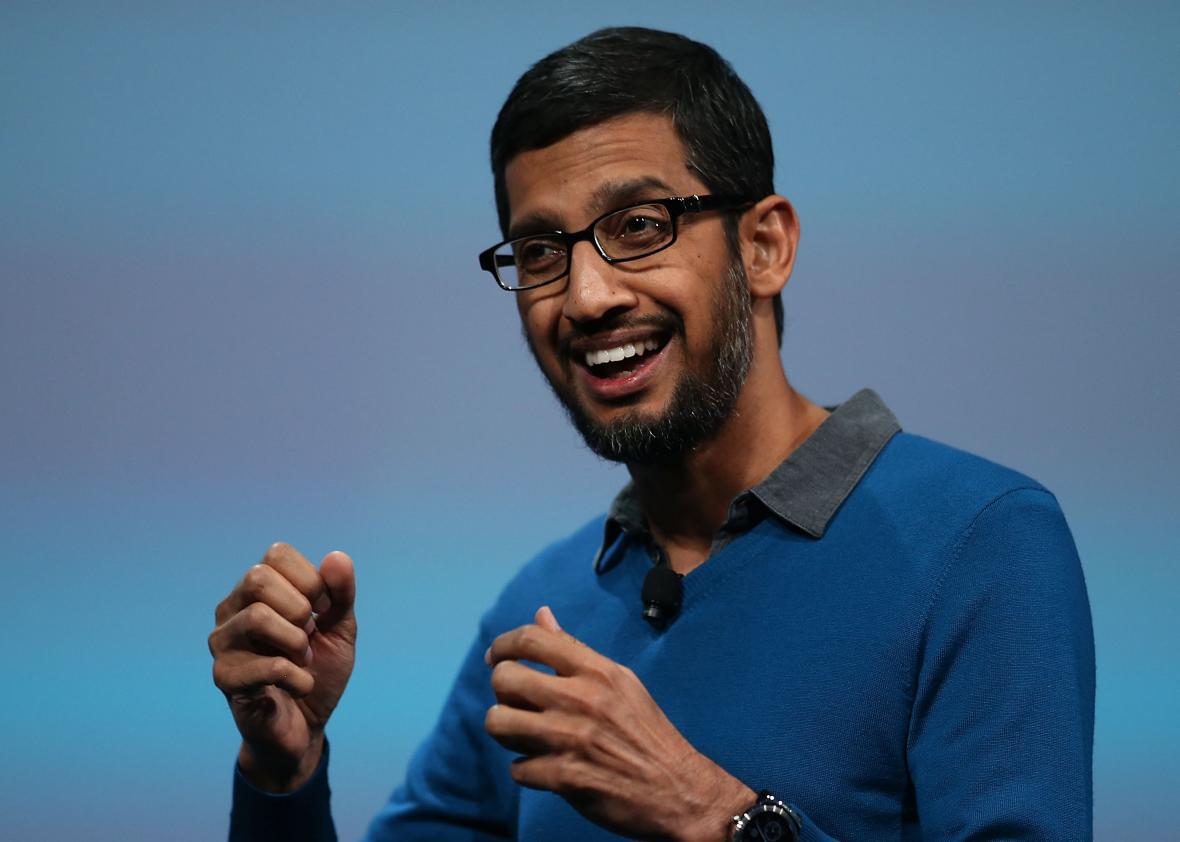On Tuesday evening, Apple took a stand against the U.S. government. CEO Tim Cook published a letter of opposition to a federal court order requiring the company to develop software that would allow the FBI to hack the iPhone 5C of a suspect in last December’s mass shooting in San Bernardino. By Wednesday morning, debates were raging over whether Apple had taken a courageous stand or had acted disgracefully.
Utterly absent from those debates were the voices of Apple’s four largest rivals: Google, Microsoft, Facebook, and Amazon. Their silence did not pass unnoticed:
That finally changed on Wednesday evening, when Google CEO Sundar Pichai issued a mini-tweetstorm. Here’s the first in the series:
Google gives law enforcement “access to data based on valid legal orders,” Pichai went on. “But that’s wholly different than requiring companies to enable hacking of customer devices and data.” That, he added, “could be a troubling precedent.” Here’s his final tweet:
A quick read might lead you to think that Pichai was endorsing Apple’s stand. Indeed, his comments earned headlines such as, “Google CEO Stands Firm With Apple.” But to describe Pichai’s words as “standing firm” is a stretch. These tweets sounded more like the cautious equivocations of a candidate for political office. Reading between the lines, what Pichai did not say is more illuminating than what he did.
What Pichai said: “Important post by Tim Cook.” (Pichai did not link to the post.)
What he did not say: “I support Apple’s stand.”
What Pichai said: “Could be a troubling precedent.”
What he did not say: “The FBI’s request is unacceptable.”
What Pichai said: “Looking forward to a thoughtful and open discussion on this important issue.”
What he did not say: “If Google were in Apple’s position, we would do the same.”
It’s also instructive to note how and where Google chose to weigh in: not via a press release, or a statement on Google’s website, or an amicus brief to the court, but on the personal Twitter account of the company’s CEO. Asked for comment on Thursday, Google chose not to say anything new. Instead, I was directed to Pichai’s tweets.
While Google has been less than outspoken in its support of Apple’s stand, the other major tech companies have been totally silent. Facebook, Microsoft, Amazon, and Twitter have so far declined to talk about the Apple case. In lieu of direct comment, Facebook, Microsoft, and Twitter referred press inquiries to a statement from a coalition called Reform Government Surveillance, to which they all belong. (Amazon does not belong to the coalition and hasn’t issued any kind of statement.)
Here is the full text of that statement:
Reform Government Surveillance companies believe it is extremely important to deter terrorists and criminals and to help law enforcement by processing legal orders for information in order to keep us all safe. But technology companies should not be required to build in backdoors to the technologies that keep their users’ information secure. RGS companies remain committed to providing law enforcement with the help it needs while protecting the security of their customers and their customers’ information.
The statement rather obviously avoids any mention of the case at hand. More subtly, it condemns “backdoors” while skirting the question of whether the FBI’s request of Apple would in fact amount to a backdoor. That question is at the crux of the dispute.
There is at least one prominent tech executive who really does appear to have Apple’s back. WhatsApp CEO Jan Koum said in a Facebook post on Wednesday the very things that Pichai and others have avoided saying. The catch: Koum’s company is owned by Facebook, whose own leaders do not appear to share his sentiments.
In short, Apple’s rivals are trying to have it both ways. They want to be seen as supportive of their users’ rights to data security, but they want to do so without actually taking a stand on this case. And they’ve gone to some rhetorical lengths to cover their backsides no matter how it turns out.
It’s understandable that Google, Microsoft, and the rest would be wary of weighing in on another corporation’s legal battle. No doubt they perceive that it’s riskier to stick their necks out here than to say little or nothing. Basically, they’re acting with just the sort of caution we’ve come to expect from multinational corporations when it comes to sensitive political issues.
But their caution comes with a certain risk of its own. As I argued on Wednesday, Apple’s high-profile clash with the law—whatever the outcome—will bolster its image as the tech company that cares about privacy. Its rivals’ meek response will help Apple make that case.
